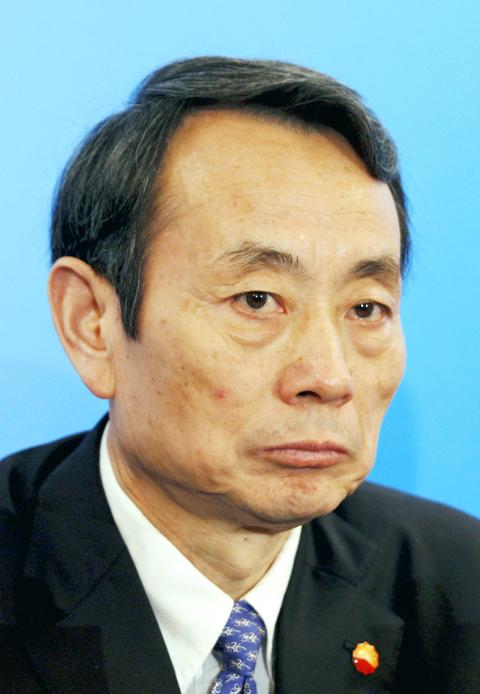Former Chinese state assets chief Jiang Jiemin (蔣潔敏) — one of the highest-profile casualties of the nation’s anti-graft drive and an ally of former Chinese security chief Zhou Yongkang (周永康) — confessed to corruption at his trial yesterday, a court said.
Jiang admitted his offenses at the Hanjiang Intermediate People’s Court in the central province of Hubei, the court said on Sina Weibo.
He is accused of bribery and abuse of power, the court said, adding that Jiang allegedly possessed “a huge amount of assets of unknown origin.”

Photo: Reuters
In a lengthy address, Jiang admitted his guilt and appealed for leniency, the court said.
“The facts of my crime are clear, the evidence is true and undeniable, and the Hanjiang court’s lawsuit is objective,” Jiang said, according to the court statement.
“I confess to the facts of the crime without concealing anything. I admit my guilt and repent for my crimes,” he said, adding that he had “damaged the image of the [Chinese Communist] Party within the hearts of the people.”
“For these errors, I am deeply, deeply repentant,” he said, according to the statement.
The hearing was completed yesterday afternoon and the judges “will select a date to announce the decision after deliberating in accordance with the law,” the court said.
Photographs posted by the court showed a stern-faced Jiang standing in the courtroom, clad in a dark blue jacket and with police officers towering over him on either side.
Chinese courts are closely controlled by the Chinese Communist Party, as is reporting on sensitive trials, and a guilty verdict is effectively a certainty.
Jiang worked for decades in China’s petroleum industry and rose to become chairman of China National Petroleum Corp (CNPC, 中國石油天然氣), the nation’s biggest oil producer.
He has links going back to the 1980s with Zhou, a former CNPC chief himself who went on to become China’s hugely powerful internal security chief, but was charged with bribery and abuse of power this month.
Prosecutors accused Jiang of “seeking profit in exchange for approving projects and granting promotions,” Xinhua news agency reported.
They pointed to 14 instances where Jiang “solicited or illegally accepted money and goods either directly or through his wife,” Xinhua said.
“Prosecutors pointed out that as of Aug. 31, 2013, Jiang Jiemin’s personal and family assets and expenses clearly exceeded his and his family’s lawfully earned income, and Jiang was unable to explain the source of the huge sum accounting for the difference,” Xinhua reported.
Neither Xinhua nor the court immediately provided further details.
Jiang was tapped in March 2013 to run the state-owned Assets Supervision and Administration Commission, which oversees China’s many powerful state-owned enterprises, but less than six months later, an internal Chinese Communist Party watchdog announced that it was probing him for alleged “serious disciplinary violations,” a euphemism for official corruption.
According to state-run media, the move marked the first investigation of a member of the party’s powerful Central Committee, which has about 200 members.

A Chinese aircraft carrier group entered Japan’s economic waters over the weekend, before exiting to conduct drills involving fighter jets, the Japanese Ministry of Defense said yesterday. The Liaoning aircraft carrier, two missile destroyers and one fast combat supply ship sailed about 300km southwest of Japan’s easternmost island of Minamitori on Saturday, a ministry statement said. It was the first time a Chinese aircraft carrier had entered that part of Japan’s exclusive economic zone (EEZ), a ministry spokesman said. “We think the Chinese military is trying to improve its operational capability and ability to conduct operations in distant areas,” the spokesman said. China’s growing

Taiwan yesterday denied Chinese allegations that its military was behind a cyberattack on a technology company in Guangzhou, after city authorities issued warrants for 20 suspects. The Guangzhou Municipal Public Security Bureau earlier yesterday issued warrants for 20 people it identified as members of the Information, Communications and Electronic Force Command (ICEFCOM). The bureau alleged they were behind a May 20 cyberattack targeting the backend system of a self-service facility at the company. “ICEFCOM, under Taiwan’s ruling Democratic Progressive Party, directed the illegal attack,” the warrant says. The bureau placed a bounty of 10,000 yuan (US$1,392) on each of the 20 people named in

Nine retired generals from Taiwan, Japan and the US have been invited to participate in a tabletop exercise hosted by the Taipei School of Economics and Political Science Foundation tomorrow and Wednesday that simulates a potential Chinese invasion of Taiwan in 2030, the foundation said yesterday. The five retired Taiwanese generals would include retired admiral Lee Hsi-min (李喜明), joined by retired US Navy admiral Michael Mullen and former chief of staff of the Japan Self-Defense Forces general Shigeru Iwasaki, it said. The simulation aims to offer strategic insights into regional security and peace in the Taiwan Strait, it added. Foundation chair Huang Huang-hsiung

PUBLIC WARNING: The two students had been tricked into going to Hong Kong for a ‘high-paying’ job, which sent them to a scam center in Cambodia Police warned the public not to trust job advertisements touting high pay abroad following the return of two college students over the weekend who had been trafficked and forced to work at a cyberscam center in Cambodia. The two victims, surnamed Lee (李), 18, and Lin (林), 19, were interviewed by police after landing in Taiwan on Saturday. Taichung’s Chingshui Police Precinct said in a statement yesterday that the two students are good friends, and Lin had suspended her studies after seeing the ad promising good pay to work in Hong Kong. Lee’s grandfather on Thursday reported to police that Lee had sent